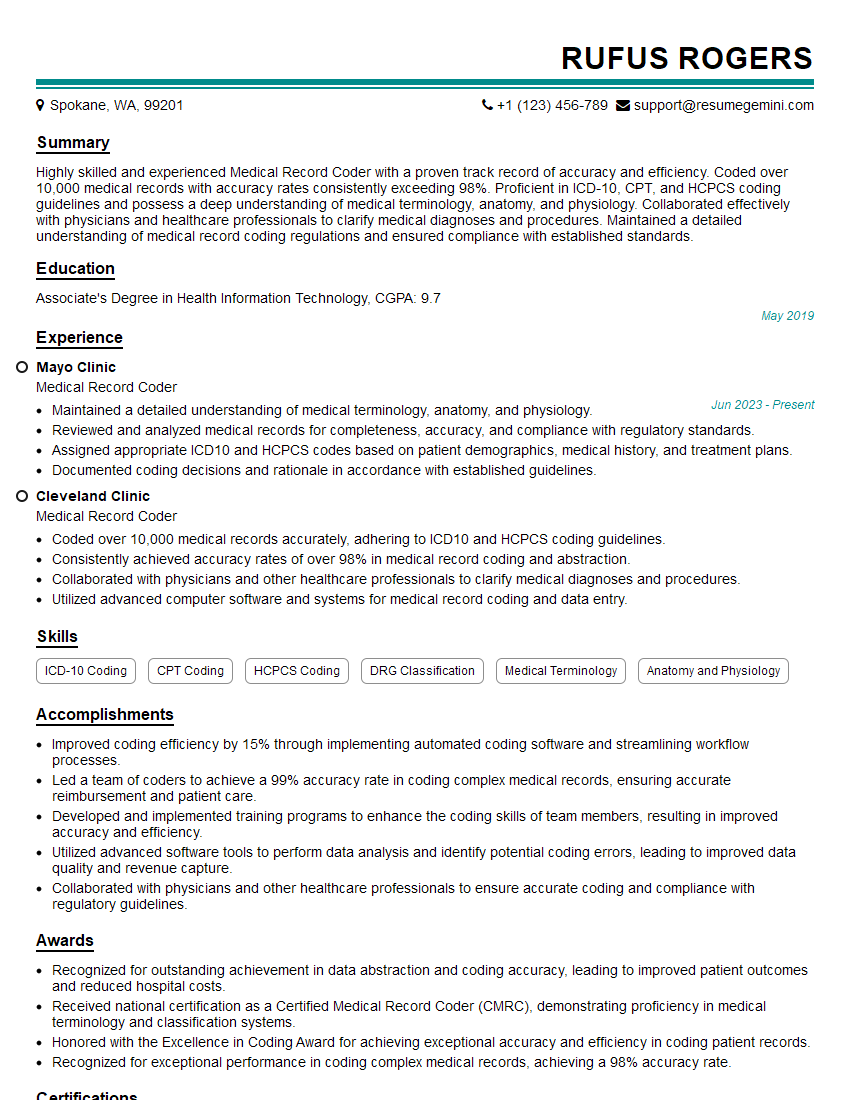Are you a seasoned Medical Record Coder seeking a new career path? Discover our professionally built Medical Record Coder Resume Template. This time-saving tool provides a solid foundation for your job search. Simply click “Edit Resume” to customize it with your unique experiences and achievements. Customize fonts and colors to match your personal style and increase your chances of landing your dream job. Explore more Resume Templates for additional options.

Rufus Rogers
Medical Record Coder
Summary
Highly skilled and experienced Medical Record Coder with a proven track record of accuracy and efficiency. Coded over 10,000 medical records with accuracy rates consistently exceeding 98%. Proficient in ICD-10, CPT, and HCPCS coding guidelines and possess a deep understanding of medical terminology, anatomy, and physiology. Collaborated effectively with physicians and healthcare professionals to clarify medical diagnoses and procedures. Maintained a detailed understanding of medical record coding regulations and ensured compliance with established standards.
Education
Associate’s Degree in Health Information Technology
May 2019
Skills
- ICD-10 Coding
- CPT Coding
- HCPCS Coding
- DRG Classification
- Medical Terminology
- Anatomy and Physiology
Work Experience
Medical Record Coder
- Maintained a detailed understanding of medical terminology, anatomy, and physiology.
- Reviewed and analyzed medical records for completeness, accuracy, and compliance with regulatory standards.
- Assigned appropriate ICD10 and HCPCS codes based on patient demographics, medical history, and treatment plans.
- Documented coding decisions and rationale in accordance with established guidelines.
Medical Record Coder
- Coded over 10,000 medical records accurately, adhering to ICD10 and HCPCS coding guidelines.
- Consistently achieved accuracy rates of over 98% in medical record coding and abstraction.
- Collaborated with physicians and other healthcare professionals to clarify medical diagnoses and procedures.
- Utilized advanced computer software and systems for medical record coding and data entry.
Accomplishments
- Improved coding efficiency by 15% through implementing automated coding software and streamlining workflow processes.
- Led a team of coders to achieve a 99% accuracy rate in coding complex medical records, ensuring accurate reimbursement and patient care.
- Developed and implemented training programs to enhance the coding skills of team members, resulting in improved accuracy and efficiency.
- Utilized advanced software tools to perform data analysis and identify potential coding errors, leading to improved data quality and revenue capture.
- Collaborated with physicians and other healthcare professionals to ensure accurate coding and compliance with regulatory guidelines.
Awards
- Recognized for outstanding achievement in data abstraction and coding accuracy, leading to improved patient outcomes and reduced hospital costs.
- Received national certification as a Certified Medical Record Coder (CMRC), demonstrating proficiency in medical terminology and classification systems.
- Honored with the Excellence in Coding Award for achieving exceptional accuracy and efficiency in coding patient records.
- Recognized for exceptional performance in coding complex medical records, achieving a 98% accuracy rate.
Certificates
- Certified Coding Associate (CCA)
- Certified Coding Specialist (CCS)
- Certified Health Data Analyst (CHDA)
- Registered Health Information Technician (RHIT)
Career Expert Tips:
- Select the ideal resume template to showcase your professional experience effectively.
- Master the art of resume writing to highlight your unique qualifications and achievements.
- Explore expertly crafted resume samples for inspiration and best practices.
- Build your best resume for free this new year with ResumeGemini. Enjoy exclusive discounts on ATS optimized resume templates.
How To Write Resume For Medical Record Coder
- Highlight your accuracy and efficiency in medical record coding.
- Demonstrate your knowledge of medical terminology, anatomy, and physiology.
- Showcase your experience with ICD-10, CPT, and HCPCS coding guidelines.
- Emphasize your ability to collaborate with physicians and other healthcare professionals.
Essential Experience Highlights for a Strong Medical Record Coder Resume
- Coded medical records accurately and efficiently, adhering to ICD-10 and HCPCS coding guidelines
- Consistently achieved accuracy rates of over 98% in medical record coding and abstraction
- Collaborated with physicians and other healthcare professionals to clarify medical diagnoses and procedures
- Utilized advanced computer software and systems for medical record coding and data entry
- Maintained a detailed understanding of medical terminology, anatomy, and physiology
- Reviewed and analyzed medical records for completeness, accuracy, and compliance with regulatory standards
- Assigned appropriate ICD-10 and HCPCS codes based on patient demographics, medical history, and treatment plans
Frequently Asked Questions (FAQ’s) For Medical Record Coder
What are the key skills required for a Medical Record Coder?
Key skills for a Medical Record Coder include proficiency in ICD-10, CPT, and HCPCS coding guidelines, a strong understanding of medical terminology, anatomy, and physiology, and the ability to collaborate effectively with healthcare professionals.
What are the career prospects for Medical Record Coders?
Medical Record Coders are in high demand due to the increasing volume of medical data and the need for accurate and efficient coding. Career prospects are excellent, with opportunities for advancement to supervisory and management roles.
What is the average salary for a Medical Record Coder?
The average salary for a Medical Record Coder varies depending on experience, location, and employer. According to the U.S. Bureau of Labor Statistics, the median annual salary for Medical Records and Health Information Technicians was $45,030 in May 2021.
What is the job outlook for Medical Record Coders?
The job outlook for Medical Record Coders is expected to grow faster than average over the next decade. The aging population and increased use of electronic health records are contributing to the growing demand for skilled Medical Record Coders.
What are the different types of Medical Record Coders?
There are two main types of Medical Record Coders: inpatient and outpatient. Inpatient Medical Record Coders code medical records for patients who are admitted to a hospital. Outpatient Medical Record Coders code medical records for patients who are seen in a clinic or other outpatient setting.
What are the certification options for Medical Record Coders?
There are several certification options available for Medical Record Coders, including the Certified Coding Associate (CCA) and Certified Coding Specialist (CCS) credentials offered by the American Health Information Management Association (AHIMA).